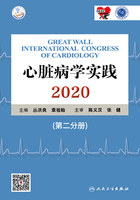
参 考 文 献
[1] KNUUTI J,WIJNS W,SARASTE A,et al. 2019 ESC Guidelines for the diagnosis and management of chronic coronary syndromes[J]. Eur Heart J,2020,41(3):407-477.
[2] MEMBERST F,MONTALESCOT G,SECHTEM U,et al. 2013 ESC guidelines on the management of stable coronary artery disease:the Task Force on the management of stable coronary artery disease of the European Society of Cardiology[J]. Eur Heart J,2013,34(38):2949-3003.
[3] REEH J,THERMING C B,HEITMANN M,et al. Prediction of obstructive coronary artery disease and prognosis in patients with suspected stable angina[J]. Eur Heart J,2019,40(18):1426-1435.
[4] SEC Working Group for the 2019 ESC guidelines on chronic coronary syndromes,Expert Reviewers for the 2019 ESC guidelines on chronic coronary syndromes,SEC Guidelines Committe,et al. Comments on the 2019 ESC guidelines on chronic coronary syndromes[J]. Rev Esp Cardiol(Engl Ed),2020,73(6):439-444.
[5] FOX K,FORD I,STEG P G,et al. Ivabradine in stable coronary artery disease without clinical heart failure[J]. N Engl J Med,2014,371(12):1091-9.
[6] EIKELBOOM J W,CONNOLLY S J,BOSCH J,et al. Rivaroxaban with or without Aspirin in Stable Cardiovascular Disease[J].N Engl J Med,2017,377(14):1319-1330.
[7] JEONG Y H. “East asian paradox”:challenge for the current antiplatelet strategy of “one-guideline-fits-all races” in acute coronary syndrome[J]. Curr Cardiol Rep,2014,16(5):485.